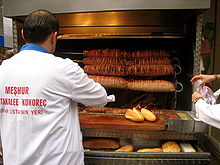Kokoretsch
Kokoretsch ( Turkish Kokoreç ) is a Turkish specialty and consists of chopped, grilled or roasted lamb - intestines . It is eaten both as a snack in a Turkish baguette ( francala ) and served on a plate with side dishes as a main meal. Kokoreç is known and very popular all over Turkey. It is also widespread in the countries of the Balkan Peninsula .
Manufacturing
After careful cleaning, the intestines are wound onto skewers like a coil. The core of such a casing roll and the intermediate layers are made of lamb fat to prevent the food from drying out when grilling or roasting.
preparation
Kokoreç is either fried on a hot sheet or, more often in larger restaurants, traditionally rolled up on a horizontal skewer and grilled in a special grill, which is usually fired with charcoal.
The most commonly used spices are mainly salt , pepper , thyme , cumin and hot paprika powder or coarsely chopped paprika flakes.
Kokoreç is served chopped into small pieces either on the plate or very often in a half or quarter small Turkish bread loaf ( somun or francala ), which is filled with the ingredients similar to a kebab .
A distinction is made in Turkey between the Istanbul and the Izmir variants. The Istanbul version is also served with chopped tomatoes and onions , which the Izmir version lacks.
Side dishes
Traditionally, Şalgam , a spicy beet juice, or Ayran , a kind of salty yoghurt drink, is preferred as a drink to accompany Kokoreç . As a side dish to be sharp on request, pickled green peppers or other pickled vegetables (see also: pickles ) enough.
Others
In the past Kokoreç was often sold by hawkers in Turkey , but this was later banned for hygienic reasons and the sale was therefore restricted to restaurants. However, there are still numerous sellers who cook their Kokoreç in small mobile grill carts over charcoal and sell them directly to walk-in customers. The dish is still very popular and is even more than a doner kebab the typical Turkish snack.
Origin and Etymology
The origin of Kokoreç or the etymology of the word can no longer be unequivocally clarified today. It is also prepared in various Balkan countries. For example, in Greece a similar shape is known as Kokoretsi .
In the Serbian language , the word kukuruz means maize , which could indicate the similar shape of the kokoreç rolls. It is the same in many other Slavic languages , such as Russian Kukuruza or Polish Kukurydza, always with the meaning of corn .
A word origin or even origin of the food from the Albanian language is possible ; here the similar word is called Kukurec , which in turn means tripe . Here one could speculate on a possible earlier way of preparing tripe in Albania , which could explain the entry into Turkish cuisine . The name 'Kokoreç' could possibly have been adopted, although lamb intestines were used over time instead of tripe . So far, however, there is no reliable evidence for any of these theses.


